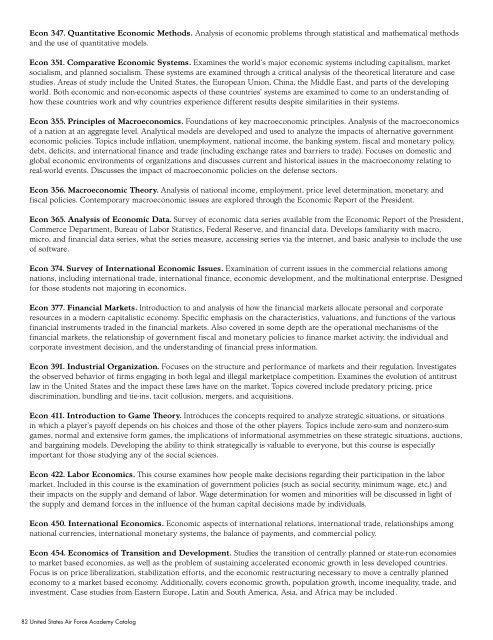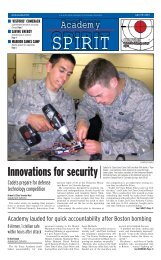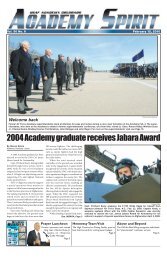2008-2009 Catalog - United States Air Force Academy
2008-2009 Catalog - United States Air Force Academy
2008-2009 Catalog - United States Air Force Academy
Create successful ePaper yourself
Turn your PDF publications into a flip-book with our unique Google optimized e-Paper software.
Econ 347. Quantitative Economic Methods. Analysis of economic problems through statistical and mathematical methods<br />
and the use of quantitative models.<br />
Econ 351. Comparative Economic Systems. Examines the world’s major economic systems including capitalism, market<br />
socialism, and planned socialism. These systems are examined through a critical analysis of the theoretical literature and case<br />
studies. Areas of study include the <strong>United</strong> <strong>States</strong>, the European Union, China, the Middle East, and parts of the developing<br />
world. Both economic and non-economic aspects of these countries’ systems are examined to come to an understanding of<br />
how these countries work and why countries experience different results despite similarities in their systems.<br />
Econ 355. Principles of Macroeconomics. Foundations of key macroeconomic principles. Analysis of the macroeconomics<br />
of a nation at an aggregate level. Analytical models are developed and used to analyze the impacts of alternative government<br />
economic policies. Topics include inflation, unemployment, national income, the banking system, fiscal and monetary policy,<br />
debt, deficits, and international finance and trade (including exchange rates and barriers to trade). Focuses on domestic and<br />
global economic environments of organizations and discusses current and historical issues in the macroeconomy relating to<br />
real-world events. Discusses the impact of macroeconomic policies on the defense sectors.<br />
Econ 356. Macroeconomic Theory. Analysis of national income, employment, price level determination, monetary, and<br />
fiscal policies. Contemporary macroeconomic issues are explored through the Economic Report of the President.<br />
Econ 365. Analysis of Economic Data. Survey of economic data series available from the Economic Report of the President,<br />
Commerce Department, Bureau of Labor Statistics, Federal Reserve, and financial data. Develops familiarity with macro,<br />
micro, and financial data series, what the series measure, accessing series via the internet, and basic analysis to include the use<br />
of software.<br />
Econ 374. Survey of International Economic Issues. Examination of current issues in the commercial relations among<br />
nations, including international trade, international finance, economic development, and the multinational enterprise. Designed<br />
for those students not majoring in economics.<br />
Econ 377. Financial Markets. Introduction to and analysis of how the financial markets allocate personal and corporate<br />
resources in a modern capitalistic economy. Specific emphasis on the characteristics, valuations, and functions of the various<br />
financial instruments traded in the financial markets. Also covered in some depth are the operational mechanisms of the<br />
financial markets, the relationship of government fiscal and monetary policies to finance market activity, the individual and<br />
corporate investment decision, and the understanding of financial press information.<br />
Econ 391. Industrial Organization. Focuses on the structure and performance of markets and their regulation. Investigates<br />
the observed behavior of firms engaging in both legal and illegal marketplace competition. Examines the evolution of antitrust<br />
law in the <strong>United</strong> <strong>States</strong> and the impact these laws have on the market. Topics covered include predatory pricing, price<br />
discrimination, bundling and tie-ins, tacit collusion, mergers, and acquisitions.<br />
Econ 411. Introduction to Game Theory. Introduces the concepts required to analyze strategic situations, or situations<br />
in which a player’s payoff depends on his choices and those of the other players. Topics include zero-sum and nonzero-sum<br />
games, normal and extensive form games, the implications of informational asymmetries on these strategic situations, auctions,<br />
and bargaining models. Developing the ability to think strategically is valuable to everyone, but this course is especially<br />
important for those studying any of the social sciences.<br />
Econ 422. Labor Economics. This course examines how people make decisions regarding their participation in the labor<br />
market. Included in this course is the examination of government policies (such as social security, minimum wage, etc.) and<br />
their impacts on the supply and demand of labor. Wage determination for women and minorities will be discussed in light of<br />
the supply and demand forces in the influence of the human capital decisions made by individuals.<br />
Econ 450. International Economics. Economic aspects of international relations, international trade, relationships among<br />
national currencies, international monetary systems, the balance of payments, and commercial policy.<br />
Econ 454. Economics of Transition and Development. Studies the transition of centrally planned or state-run economies<br />
to market based economies, as well as the problem of sustaining accelerated economic growth in less developed countries.<br />
Focus is on price liberalization, stabilization efforts, and the economic restructuring necessary to move a centrally planned<br />
economy to a market based economy. Additionally, covers economic growth, population growth, income inequality, trade, and<br />
investment. Case studies from Eastern Europe, Latin and South America, Asia, and Africa may be included.<br />
82 <strong>United</strong> <strong>States</strong> <strong>Air</strong> <strong>Force</strong> <strong>Academy</strong> <strong>Catalog</strong>
















